Understanding skill progression paths in multiplayer fantasy adventure games enhances player engagement and strategy. Key aspects include leveling abilities, choosing specializations, and exploring hybrid builds. The effectiveness of these systems relies on player motivation, reward structures, and clear skill trees. Multiplayer dynamics foster competition and collaboration, enriching the skill acquisition experience.
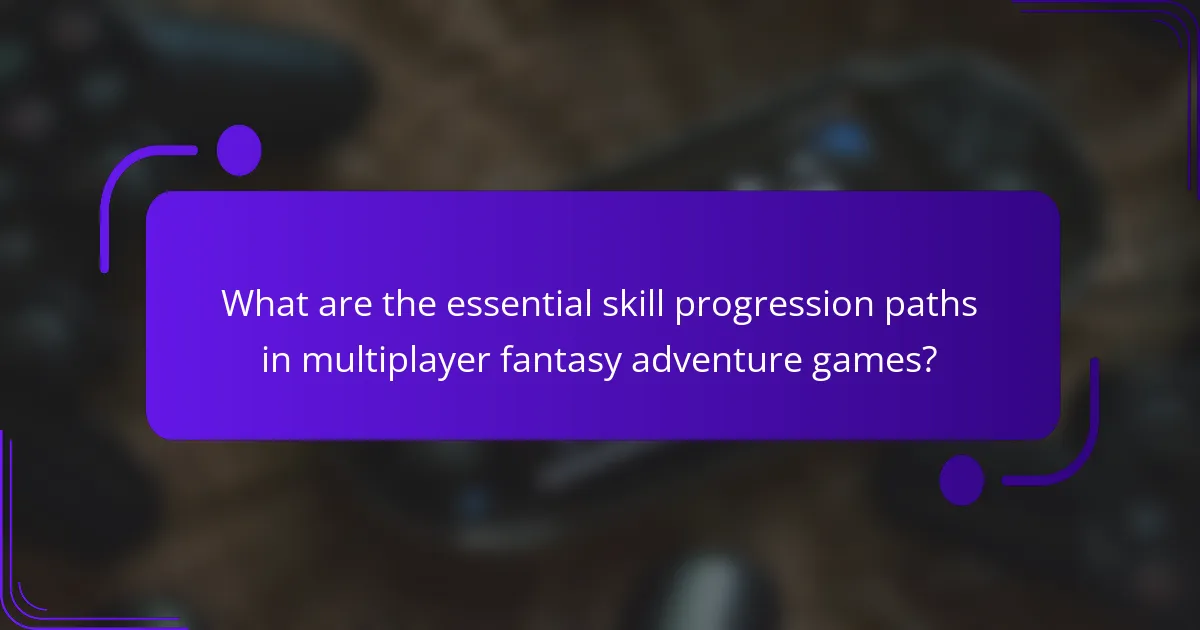
What are the essential skill progression paths in multiplayer fantasy adventure games?
Skill progression paths in multiplayer fantasy adventure games typically include leveling up abilities, acquiring new skills, and enhancing character attributes. Players often choose between different specializations or classes that influence their skill development. Key paths may involve combat skills, crafting abilities, or magic proficiency, each offering unique gameplay experiences. Players can also explore hybrid paths that combine elements from multiple specializations, allowing for versatile character builds.
How do skill trees influence player choices and gameplay?
Skill trees significantly influence player choices and gameplay by providing structured paths for character development. Players select skills that align with their preferred playstyle, impacting combat strategies and team dynamics.
Skill trees offer flexibility, allowing players to specialize in roles such as tank, damage dealer, or support. This specialization fosters diverse gameplay experiences and encourages collaboration among players.
The unique attributes of skill trees, such as branching paths and synergies, create strategic depth. Players must consider the long-term implications of their choices, enhancing engagement and replayability.
As a result, skill trees are essential in shaping player agency and enriching the overall gaming experience in multiplayer fantasy adventure games.
What role do character classes play in skill development?
Character classes significantly influence skill development in multiplayer fantasy adventure games. Each class offers unique abilities and progression paths, shaping player strategies and experiences.
For example, a warrior class may focus on melee combat skills, enhancing attributes like strength and durability. In contrast, a mage class emphasizes spellcasting, promoting intelligence and mana management. This differentiation allows players to tailor their gameplay according to their preferred playstyle.
As players advance, they unlock new skills that align with their chosen class, fostering a sense of identity and growth. The unique attributes of each class create diverse gameplay experiences, encouraging teamwork and collaboration among players with different roles.
Ultimately, character classes serve as a foundation for skill progression, driving engagement and replayability in the game.
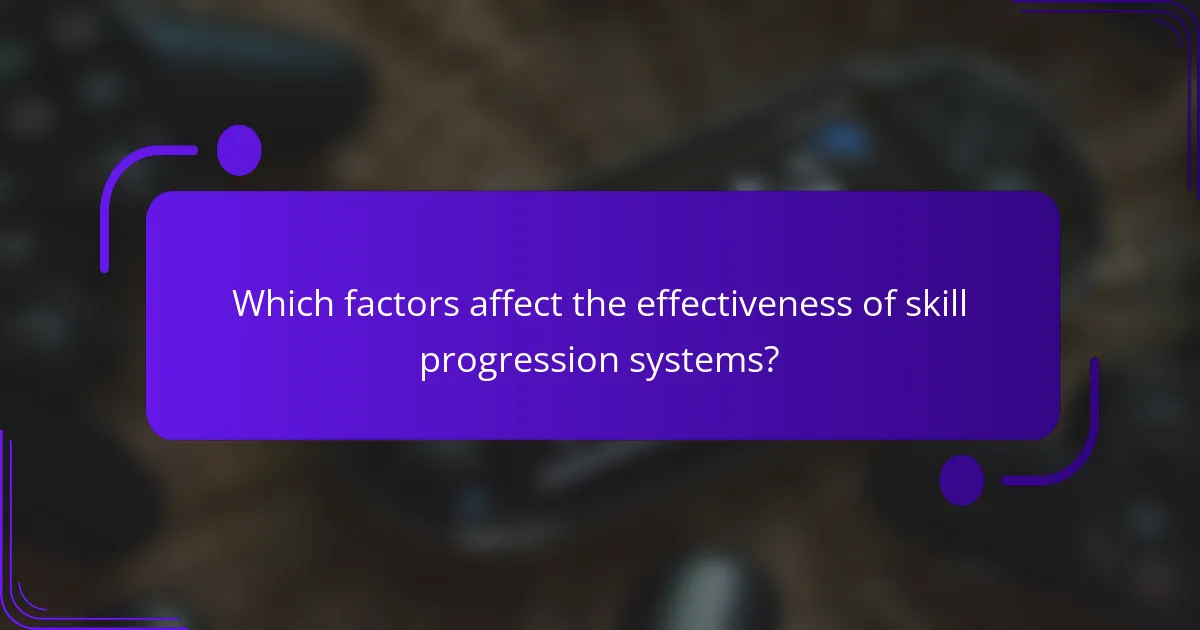
Which factors affect the effectiveness of skill progression systems?
The effectiveness of skill progression systems is influenced by player engagement, reward structures, and the clarity of skill trees. Player motivation drives the desire to progress, while well-designed rewards enhance satisfaction. Clear skill trees help players understand their options and strategies.
How does player engagement impact skill acquisition?
Player engagement significantly enhances skill acquisition in multiplayer fantasy adventure games. Higher engagement levels lead to more practice opportunities, enabling players to refine their abilities and strategies.
Active participation fosters a deeper understanding of game mechanics, which accelerates skill development. Engaged players often seek challenges, pushing their limits and enhancing their learning curve.
Moreover, social interactions within the game contribute to skill acquisition. Players can learn from peers, share strategies, and receive feedback, creating a collaborative environment that supports growth.
Lastly, game design elements, such as rewards for achievements, further motivate players to engage consistently, reinforcing their commitment to skill progression.
What are the common challenges faced during skill progression?
Players commonly face challenges like resource management, skill balancing, and time investment during skill progression in multiplayer fantasy adventure games. These obstacles can hinder advancement and enjoyment. Resource management involves acquiring and allocating items or currency effectively. Skill balancing requires players to choose the right abilities to complement their playstyle and team dynamics. Time investment often leads to frustration, as players may need to grind for experience or materials to progress. Addressing these challenges enhances the overall gaming experience and encourages player retention.
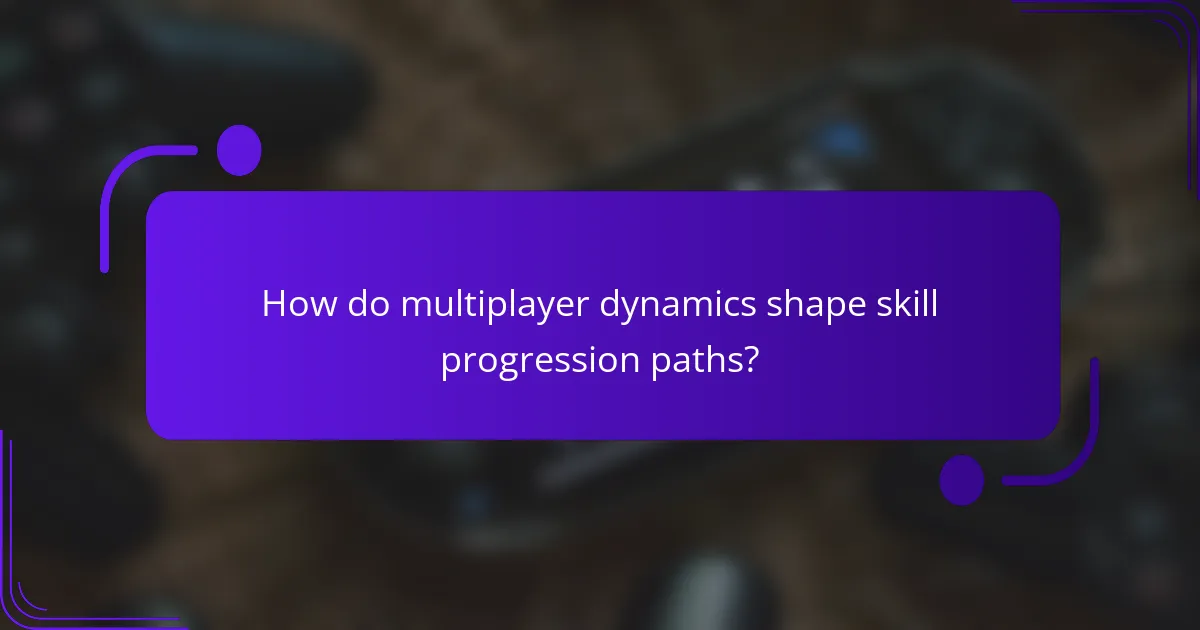
How do multiplayer dynamics shape skill progression paths?
Multiplayer dynamics significantly influence skill progression paths by fostering competition and collaboration among players. These interactions create unique learning environments that enhance skill acquisition.
In competitive scenarios, players often push each other to improve, leading to faster skill development. For instance, players may learn advanced strategies by observing skilled teammates or rivals. Collaboration, on the other hand, allows for shared knowledge and techniques, enabling players to progress through teamwork.
Additionally, multiplayer games often feature varied skill trees, allowing players to specialize based on group dynamics. This customization lets players adapt their skills to complement team strategies, enhancing overall effectiveness.
Finally, social interactions within multiplayer environments can motivate players to engage more deeply with the game, leading to increased practice and mastery of skills. This interplay of competition, collaboration, and social motivation shapes diverse and dynamic skill progression paths.
What strategies can players use to optimize their skill development in cooperative settings?
Players can optimize their skill development in cooperative settings by focusing on communication, role specialization, and practice. Effective communication enhances teamwork and strategy execution. Role specialization allows players to master specific skills, increasing overall group efficiency. Consistent practice reinforces learned strategies and improves individual and team performance. Engaging in diverse scenarios can further refine skills and adaptability.
How do competitive environments influence skill choices?
Competitive environments significantly shape skill choices in multiplayer fantasy adventure games by promoting adaptability and strategic planning. Players often select skills that counter opponents’ strengths or exploit weaknesses. This dynamic encourages a diverse skill set, enhancing gameplay depth.
In competitive scenarios, players prioritize skills that provide immediate advantages, such as crowd control or damage mitigation. As a result, skill progression paths may shift to favor these attributes, impacting long-term character development.
Unique attributes, like exclusive abilities tied to specific classes, become crucial in competitive settings. These skills can differentiate players and influence team compositions, leading to varied strategies based on the competitive landscape.
Moreover, rare attributes, such as synergistic skill combinations, can emerge in response to evolving competitive trends. Players adapt their choices to maximize effectiveness against prevalent strategies, creating a constantly shifting meta.

What are the most popular skill progression models in 2025?
The most popular skill progression models in 2025 for multiplayer fantasy adventure games include talent trees, experience points systems, and skill-based leveling. Talent trees allow players to customize abilities through branching paths. Experience points systems reward players for completing quests and defeating enemies, enhancing overall character growth. Skill-based leveling focuses on improving specific skills through usage, promoting a more immersive gameplay experience. Each model offers unique attributes that cater to different player preferences, enhancing engagement and strategy.
How do linear vs. branching skill trees compare in player experience?
Linear skill trees provide a straightforward progression, while branching skill trees offer greater customization. Players experience a sense of control with branching paths, enhancing engagement. Linear paths streamline skill acquisition, making it easier to understand. Each approach caters to different player preferences, affecting overall enjoyment and strategy.
What are the benefits of hybrid skill systems?
Hybrid skill systems enhance gameplay by offering diverse character development options, encouraging player creativity. They allow for unique combinations of skills, fostering strategic depth and personalization. Players can tailor their abilities to suit various playstyles, improving engagement. This system promotes collaboration, as players can specialize in different skills, creating a balanced team dynamic.
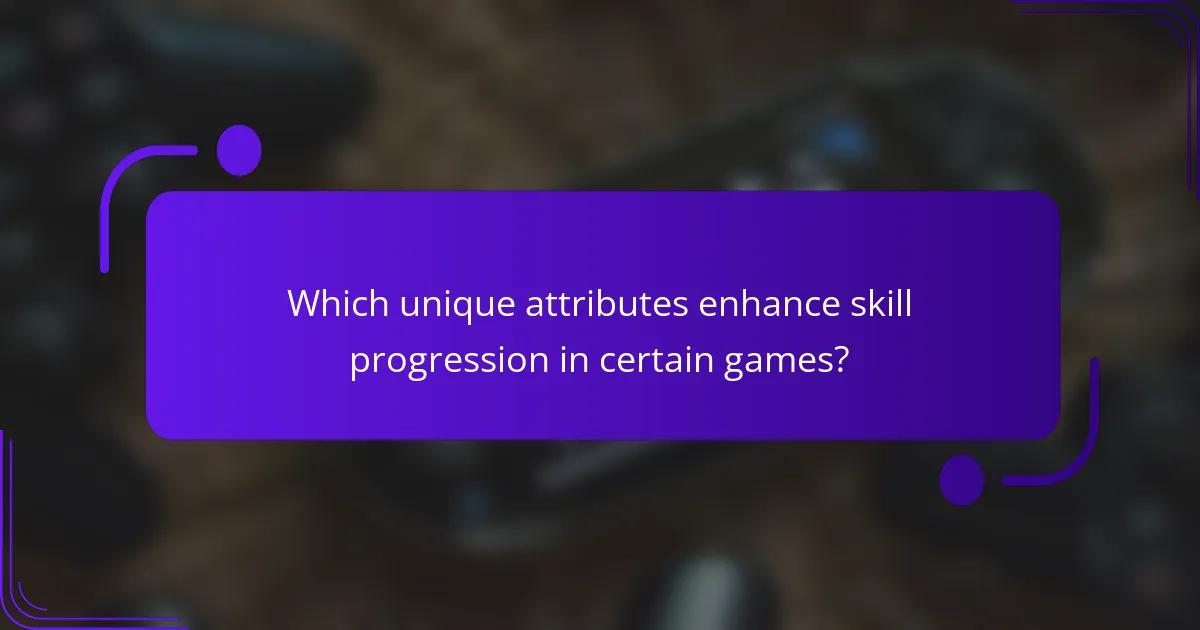
Which unique attributes enhance skill progression in certain games?
Unique attributes that enhance skill progression in multiplayer fantasy adventure games include adaptive learning systems, customizable skill trees, and dynamic difficulty adjustment. Adaptive learning systems analyze player performance to provide tailored challenges. Customizable skill trees allow players to choose specific abilities, fostering personal play styles. Dynamic difficulty adjustment modifies game challenges based on player skill level, ensuring consistent engagement and growth. These attributes collectively promote a more personalized and rewarding progression experience.
How do narrative elements influence skill choices and player investment?
Narrative elements significantly shape skill choices and player investment in multiplayer fantasy adventure games. Engaging storylines create emotional connections, motivating players to invest time in developing their characters.
Character backstories influence skill selection, as players often align abilities with their character’s narrative. For instance, a character with a tragic past may inspire players to choose defensive skills for protection.
Dynamic quests and evolving story arcs also impact player investment. Players are more likely to pursue skills that enhance their experience within the narrative, leading to deeper immersion.
Finally, social interactions within the game, driven by narrative elements, encourage collaboration and skill sharing, fostering a community that enhances overall player engagement.
What innovative skill systems have emerged in recent titles?
Recent titles in multiplayer fantasy adventure games have introduced innovative skill progression systems that enhance player engagement. These systems often feature branching paths, allowing players to customize their abilities based on playstyle.
One notable example is the integration of skill trees that adapt to player choices, promoting unique character builds. This dynamic approach encourages exploration and experimentation. Additionally, some games implement hybrid systems combining traditional leveling with skill-based advancements, rewarding players for mastering specific techniques.
Another emerging trend is the use of real-time skill evolution, where abilities improve through usage rather than fixed experience points. This creates a more immersive experience, as players actively develop their skills during gameplay.
Finally, cross-class skill sharing has gained popularity, enabling players to blend abilities from different classes, fostering creativity in character development. These innovative systems reflect a shift towards more personalized and engaging gameplay experiences.
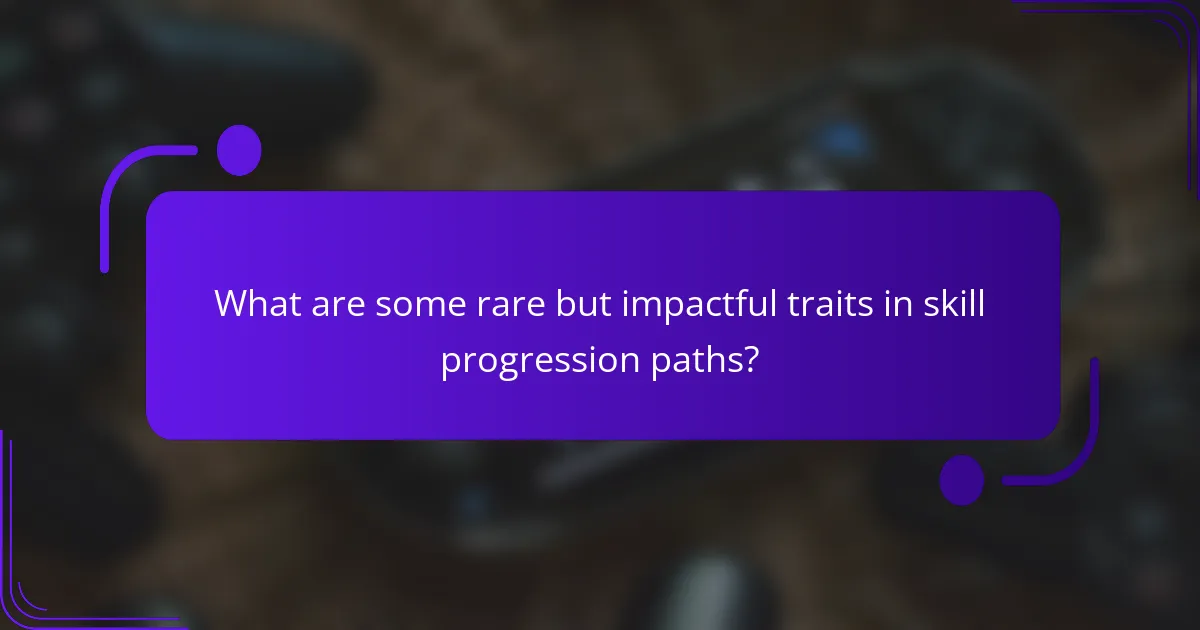
What are some rare but impactful traits in skill progression paths?
Rare traits in skill progression paths can significantly enhance gameplay. Unique skill synergies and hidden mastery levels are impactful traits. These features encourage players to explore unconventional builds and deepen engagement. Additionally, environmental adaptations, where skills evolve based on surroundings, create dynamic experiences. Such rare attributes enrich player strategy and enjoyment in multiplayer fantasy adventure games.
How do seasonal events affect skill development opportunities?
Seasonal events significantly enhance skill development opportunities in multiplayer fantasy adventure games. These events often introduce unique challenges and limited-time quests that encourage players to explore new strategies and refine their skills.
Participating in seasonal events allows players to gain exclusive rewards that can enhance their characters’ abilities. For instance, special gear or experience boosts can be obtained, providing a unique attribute that differentiates these events from regular gameplay.
Additionally, seasonal events often foster community engagement through cooperative gameplay, which can lead to skill sharing and collaboration. Players may learn new tactics from others, thereby accelerating their skill progression.
As a result, seasonal events serve as crucial catalysts for skill development, offering both new experiences and opportunities to master game mechanics.
What are the implications of limited-time skills on player strategy?
Limited-time skills significantly impact player strategy by creating urgency and prioritizing resource allocation. Players must quickly assess which skills to develop, balancing immediate benefits against long-term goals. This dynamic encourages experimentation and adaptability, as players navigate skill trees with time constraints. Limited-time skills can also foster competition, pushing players to optimize their builds for specific events or challenges, ultimately enhancing engagement in multiplayer fantasy adventure games.
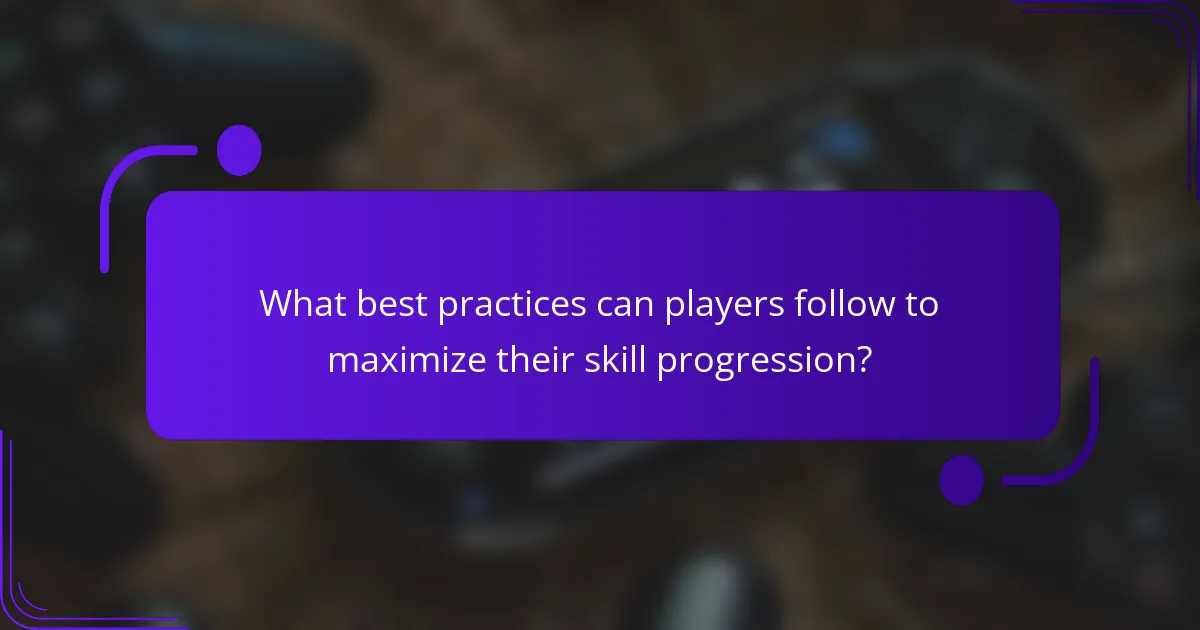
What best practices can players follow to maximize their skill progression?
Players can maximize skill progression by focusing on consistent practice, strategic gameplay, and engaging with community resources. Regularly participating in quests and challenges enhances experience points, while studying game mechanics improves decision-making. Collaborating with experienced players provides insights into advanced strategies. Additionally, utilizing in-game resources effectively can lead to efficient skill development.
How can players balance skill development with overall gameplay enjoyment?
Players can balance skill development with gameplay enjoyment by integrating practice sessions into regular play. Focus on enjoyable aspects of gameplay while gradually enhancing skills. Setting personal goals can motivate skill improvement without sacrificing fun. Engaging with the community for tips can also improve skills while maintaining enjoyment.
What common mistakes should players avoid in skill progression?
Players should avoid common mistakes that hinder skill progression, such as neglecting resource management, failing to practice consistently, and ignoring feedback. Prioritizing the wrong skills can also stall growth. Additionally, overlooking team dynamics and not adapting strategies can limit advancement.